Vegetarian to Vegan, Milk to Mylk
My journey from vegetarianism to veganism began with coconut mylk for beverages and cooking and daiya vegan cheeze. I realized that most cheese has rennent from cow stomach and therefore technically not vegetarian. So cheese started to gross me out and so did milk when every time I drank it I remembered it's a blood product derived from enslavement and torture. Anyway, I started to go to coffee shops that serve alternative mylk (like nut, pea, seed, legume) at Starbucks and Waves. Blenz has it too, but I think their coffee is crap haha.
Coocoo for coco mylk
I went to a local coffee shop once really wanting a coffee, but they only had soy mylk. I assumed it wouldn't taste good (I had almond mylk in tea before and it didn't taste good). But I saw the soy mylk was non-GMO and organic, so I went for it. It was actually delicious! I had seen Tim Hortons here and there that have the enjoy it with soy option. It's something that planted a seed in my brain, but I didn't bother trying it until then. Now I can have a Tim Horton's coffee again - it's only a $1.50 compred to $2+ at other places, and many friends like Timmy's. It's nice to be able to go places on a whim with friends instead of saying "I can't go there because I'm vegan". I also like soy mylk in tea, and I should maybe try almond mylk (and other variations) with coffee.
 However, since it's "off-menu" they don't have to keep it in stock and may disappoint you. Also, refined white sugar isn't vegan, so maybe avoid Timmy's.
However, since it's "off-menu" they don't have to keep it in stock and may disappoint you. Also, refined white sugar isn't vegan, so maybe avoid Timmy's.
No Monsanto: OMG the GMOs and OMAs
My soy mylk coffee tasted so good, but I was wondering if it was a guilty pleasure. I've heard so many rumors about soy boys and soy having estrogen therefore causing hormonal disruption and cancer. So, I started to do my research before adding soy mylk to my fridge.
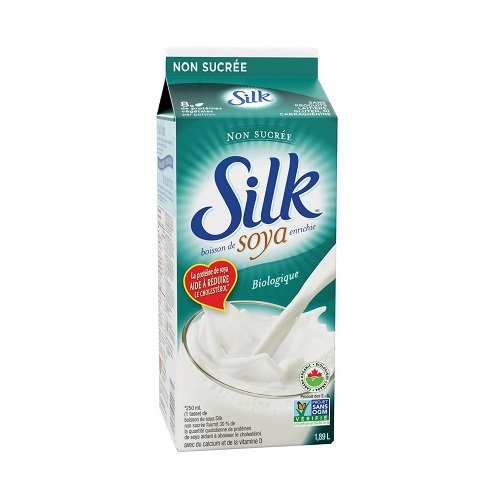
Organic, non-gmo soy does not cause cancer, it treats it. In regular dietary amounts, it treats and prevents many types of cancer. The only exception may be fermented soy products like tofu, but data is still limited. Read more about Fermented Soy at the bottom.
Soy TREATS cancer https://www.ncbi.nlm.nih.gov/pubmed/29963755 (5),
- Ovarian Cancer: "Our findings suggest that a diet high in plant protein reduces the growth of human ovarian cancer cells in mice compared to a diet high in animal protein..." https://www.ncbi.nlm.nih.gov/pubmed/29844867 (17),
- Breast Cancer: "Soy food intake may have protective effects against the risk for breast cancer, including estrogen receptor (ER)-negative breast cancer...This study suggests that long-term prediagnosis soy intake may lead to increased expression of tumor suppressors and decreased expression of oncogenes, especially cell growth-related genes, in breast tumor tissues". https://www.ncbi.nlm.nih.gov/pubmed/27183356 (9),
- Prostate Cancer: (isoflavones genistein and daidzein) "evidence from observational studies shows a statistically significant association between soy consumption and decreased PCa risk" https://www.ncbi.nlm.nih.gov/pubmed/29300347 (1),
- Gastric Cancer: (non-fermented) "A higher intake of nonfermented soy products was associated with a reduced cancer risk" https://www.ncbi.nlm.nih.gov/pubmed/28111424 (22).
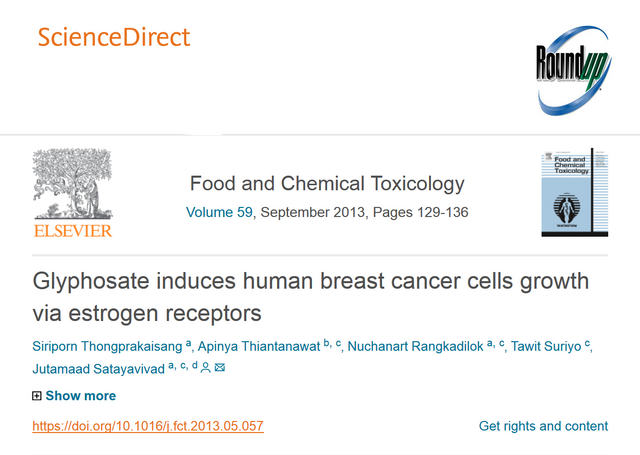
What does cause (breast) cancer and hormone dysregulation is Glyphosate - Monsanto's Round Up https://www.ncbi.nlm.nih.gov/pubmed/23756170 (20) and dairy (cow's) milk (https://www.ncbi.nlm.nih.gov/pmc/articles/PMC4705082/ (23).
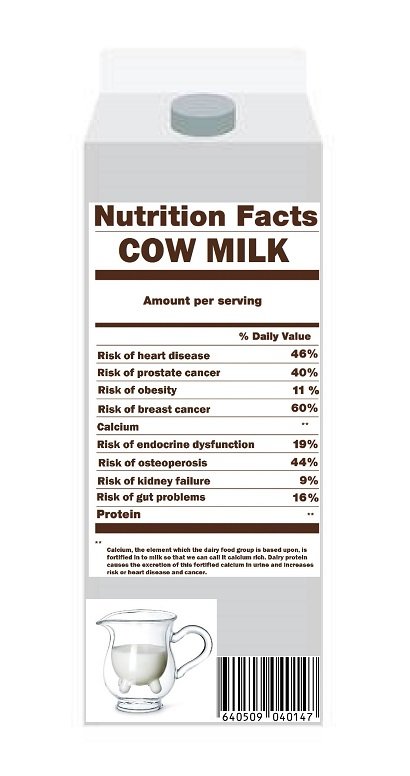
The Soy ploy: the myth of raised estrogen
Plant based soy is 100-1000x less bioavailable; therefore, high amounts of phytoestrogens in blood does not necessarily mean it all binds to receptors as if it were [human estrogen]. In fact, high blood levels or estrogen is evidence for low bioavailability. https://www.ncbi.nlm.nih.gov/pmc/articles/PMC5409663/ (14).
Soy protein supplement intake for 12 months has no effect on sexual maturation and may improve nutritional status in pre-pubertal children. https://www.ncbi.nlm.nih.gov/pubmed/29779250 (4).
"Soy contains biologically active isoflavones daidzein and genistein. Isoflavones are classified as phytoestrogens because of their estrogenic proerties but this may not be accurate. They are more accurately called 'Selective Estrogen Receptor Modulator'. Their action on the estrogen receptor is more advanced than just creating estrogen - they can have agonistic or antagonistic effects on a given estrogen receptor site depending on what is needed. For example, isoflavones have demonstrated an estorgenic effect on receptor site in tissues absent of the proper estorgen levels, and an anti-estrogenic effect on receptor sites in te presence of excess estrogen. This explains their acknowledged clinical effectiveness in both high and low estrogen cases. isoflavones have also shown to regulate the bioavailability and activity of hormones as well as male and female metabolism. They also have antiviral, anti-inflammatory, antioxidant and cardioprotective properties." Dr. Datis Kharrazian (10)
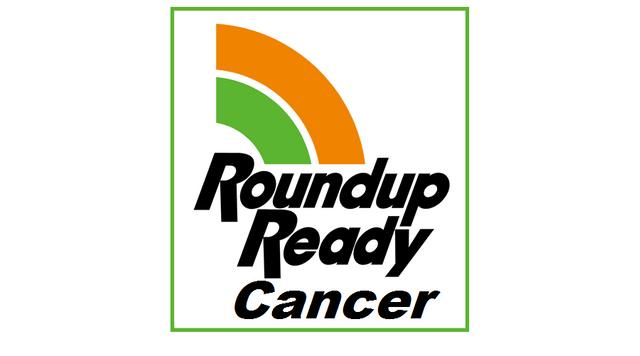
As mentioned above, Glyphosate causes breast cancer, it does so via estrogen receptors, whereas soy has the opposite effect. Dairy (cow) milk also raises hormone levels https://www.ncbi.nlm.nih.gov/pmc/articles/PMC4524299/ (12) whereas soy does not.
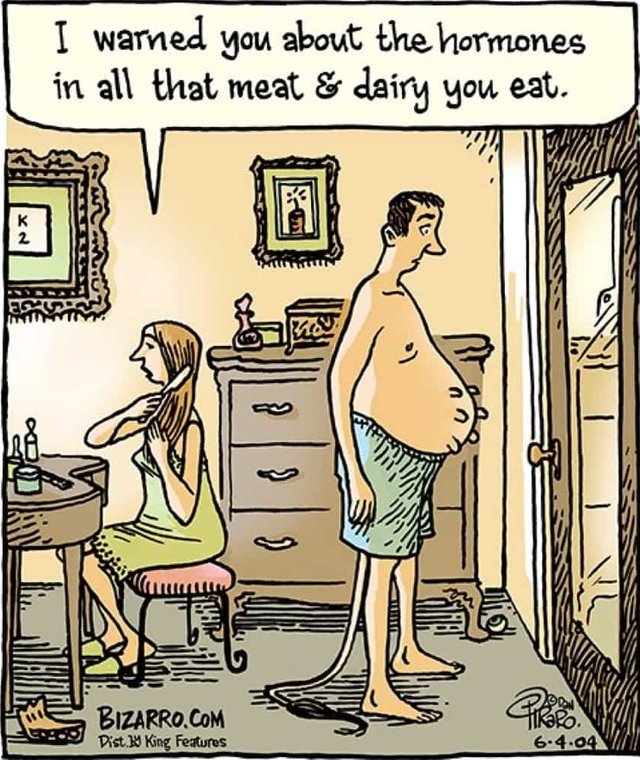
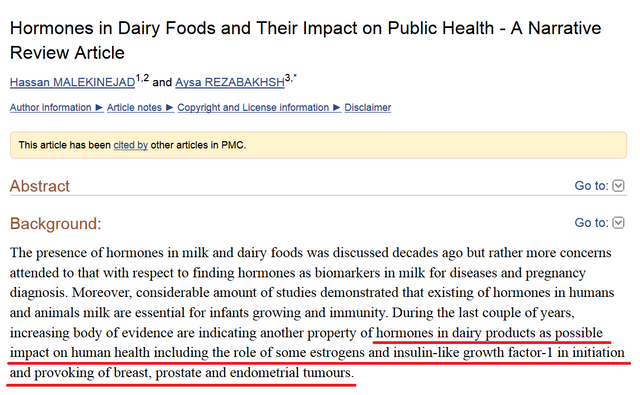
The low-down on high cholesterol
Soy mylk has 0% cholesterol and it also actively reduces human cholesterol levels.
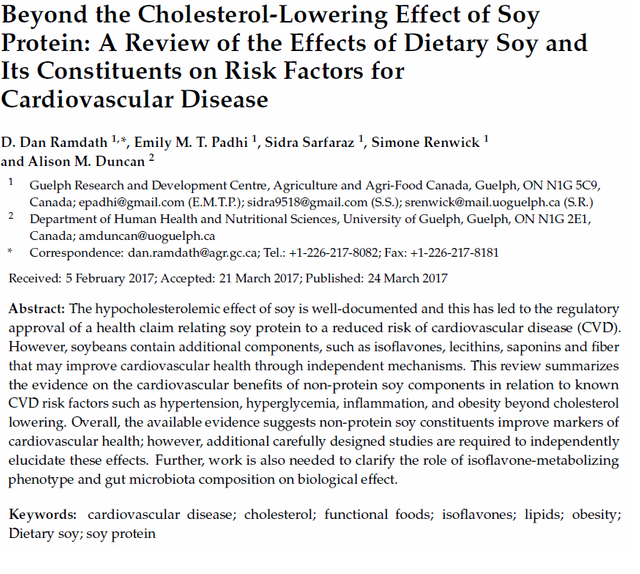
https://www.ncbi.nlm.nih.gov/pmc/articles/PMC5409663/ (14)
Go green for lean protein
One cup (250ml) has 8 g of plant proten https://www.drinksilk.ca/products/organic-unsweetened-soy-beverage (3, 16)
This protein actively reduces cholesterol https://nutritiondata.self.com/facts/vegetables-and-vegetable-products/2622/2 (3, 14)
NO cholesterol
NO trans fat and LOW saturated fat; contains omega 3 (but has 7x more omega 6)
LOW glycemic index
Good source of fibre, protein, calcium, iron, and vitamin B and C, and minerals.
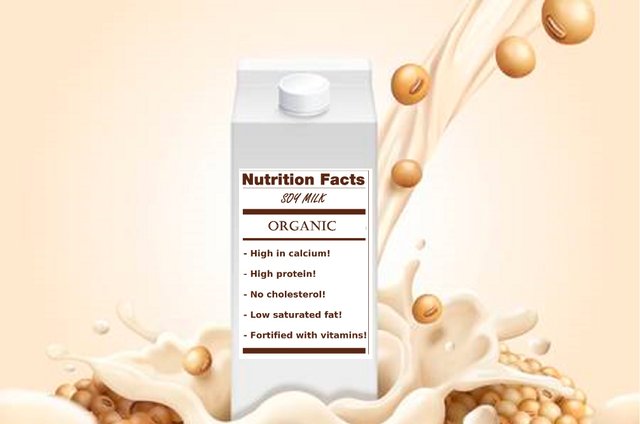
Dietary soybean protein ameliorates high-fat diet-induced obesity by modifying the gut microbiota-dependent biotransformation of bile acids.
https://www.ncbi.nlm.nih.gov/pubmed/30102711 (21)Fermented Soy and other possible health concerns
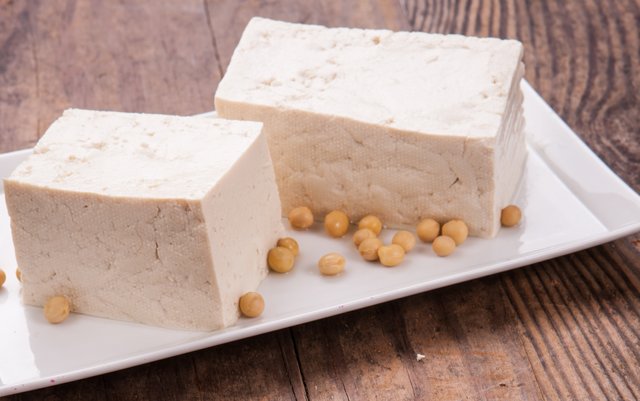
There are a few actual possible health concerns of soy aside from the myths. First is fermented soy - it may be good for heart and bones, but some evidence suggests it may increase risk of gastric (stomach) cancer. Fermented soy increases risk of GASTRIC cancer https://www.ncbi.nlm.nih.gov/pubmed/21070479 (11) but non-fermented soy decreases the risk https://www.ncbi.nlm.nih.gov/pubmed/28111424 (22), https://www.ncbi.nlm.nih.gov/pubmed/26604398 (13).
"Higher intakes of nonfermented soy foods were associated with a lower risk of stomach cancer, whereas there was no significant associations between the intake of fermented soy foods and a risk of stomach cancer. These results suggest that higher intakes of soy isoflavone have a protective effect against stomach cancer. In addition, the risk reduction appeared to be more attributed to the intake of nonfermented soy foods than fermented soy foods." (11)
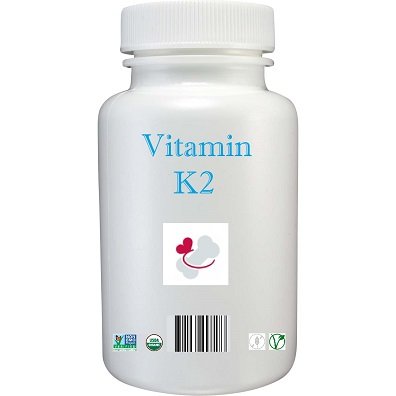
Natto contains vitamin K https://www.ncbi.nlm.nih.gov/pubmed/21394493 (7) which decreases risk of heart disease, osteoperosis, etc https://www.ncbi.nlm.nih.gov/pubmed/26604398 (13). or it may act as a goitrogen and have adverse effects on people with thyroid disease (and PCOS linked to it). People argue against soy because of products such as hyrdolyzed soy protein or hydrogenated soybean oil, which is probably true. If you're eating organic, non-gmo soy products, it's generally healthy though. Hurry up and demand stores carry it, and the supply will increase. In the U.S. almost all soy beans are Monsanto GMO round-up ready soybeans! :(
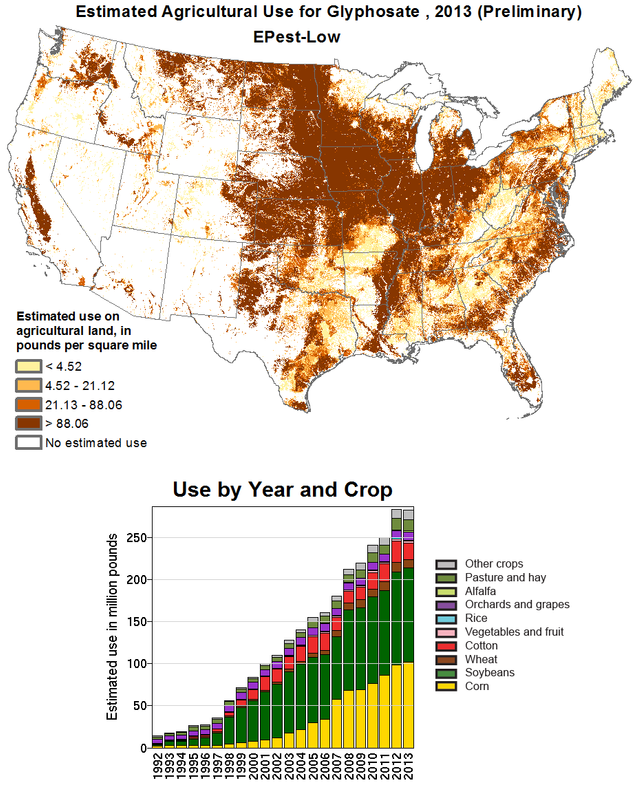

Soy's water and carbon footprint Vs. a cow's hoofprint
"Plant foods based on vegetables, cereals, and legumes present the lowest GHG emissions with the exception of those transported by airplanes. Animal products, including dairy, are associated with higher GHG emissions than plant-based products...The analysis shows that changes toward a more plant-based diet could help substantially in mitigating emissions of GHGs." https://academic.oup.com/ajcn/article/89/5/1704S/4596965#app2 (2)

Water footprint of SOY| Left: Soy milk vs dairy | Right: Soy vs beef burgrer
"The study shows that soy milk and soy burger have much smaller water footprints than their equivalent animal products. The water footprint of the soy milk product analysed in this study is 28% of the water footprint of the global average cow milk. The water footprint of the soy burger examined here is 7% of the water footprint of the average beef burger in the world. http://waterfootprint.org/media/downloads/Report49-WaterFootprintSoy.pdf (6)
https://www.nationalgeographic.com/environment/freshwater/food/ (18)
My research kept surprising me. Not only is soy not unhealthy, it actively protects against disease. Even better, the diseases people said soy mylk causes are actually caused by dairy and Monsanto. Not only is soy better for the human diet, it's better for environmental sustainability on the planet, which cannot be said about dairy and beef!

Applegate C.C. et al (2018). "Soy Consumption and the Risk of Prostate Cancer: An Updated Systematic Review and Meta-Analysis". Nutrients. Vol 10, isse 1. pii: E40. doi: 10.3390/nu10010040. https://www.ncbi.nlm.nih.gov/pubmed/29300347
Carlsson-Kanyama, A. & Gonzalez, A (2009). "Potential Contributions of Food Consumption Patterns in Climate Change". The American Journal of Clinical Nutrition, Vol 89, Issue 5, Pp. 1704S–1709S, https://doi.org/10.3945/ajcn.2009.26736AA
a) https://www.drinksilk.ca/products/organic-unsweetened-soy-beverage
b) https://www.drinksilk.ca/healthy-living/silk-vs-milkDuitama S.M. (2018). "Soy protein supplement intake for 12 months has no effect on sexual maturation and may improve nutritional status in pre-pubertal children". Journal of Paediatrric Child Health. Vol 54, issue 9, pp. 997-1004. doi: 10.1111/jpc.13934. https://www.ncbi.nlm.nih.gov/pubmed/29779250
Dutta B. et al (2018). "Soy-Derived Phytochemical Genistein Modifies Chromatome Topology to Restrict Cancer Cell Proliferation".Proteomics. Vol 18, issue 16, pp. e1700474. doi: 10.1002/pmic.201700474.
https://www.ncbi.nlm.nih.gov/pubmed/29963755Ercin, A.E. et al (2011). "The Water Footprint of Soy Milk and Soy Burger Equivalent Animal Products" UNESCO Institute for water Education at Twente Water Centre, University of Twente, Enschede, The Netherlands http://waterfootprint.org/media/downloads/Report49-WaterFootprintSoy.pdf
Fujita Y et al (2012). "Association between vitamin K intake from fermented soybeans, natto, and bone mineral density in elderly Japanese men: the Fujiwara-kyo Osteoporosis Risk in Men (FORMEN) study". Osteoporos International. Vol 23, issue 2, pp. 705-14. doi: 10.1007/s00198-011-1594-1. https://www.ncbi.nlm.nih.gov/pubmed/21394493
Galvan-Salazar-H.R. et al (2015). "Association of Milk and Meat Consumption with the Development of Breast Cancer in a Western Mexican Population". Breast Care (Basel, Switzerland). Vol 10, issue 6, pp. 393-396. https://www.ncbi.nlm.nih.gov/pmc/articles/PMC4789875/
Guo X. et al (2016). "Long-term soy consumption and tumor tissue MicroRNA and gene expression in triple-negative breast cancer". Cancer. Vol 122(16), pp. 2544-51. doi: 10.1002/cncr.29981. https://www.ncbi.nlm.nih.gov/pubmed/27183356
Kharrazian, Datis (2009). "Why Do I Still Have Thyroid Symptoms? When My Lab Tests Are Normal: A Revolutionary Breakthrough In Understanding Hashimoto's Disease and Hypothyroidism". ISBN13: 9781600376702. https://www.goodreads.com/book/show/6803393-why-do-i-still-have-thyroid-symptoms-when-my-lab-tests-are-normal
Kim J. et al (2011). "Fermented and non-fermented soy food consumption and gastric cancer in Japanese and Korean populations: a meta-analysis of observational studies". Cancer Science Vol 102, issue 1, pp. 231-44. doi: 10.1111/j.1349-7006.2010.01770.x. https://www.ncbi.nlm.nih.gov/pubmed/21070479
Malekinejad H. & Rezabakhsh A (2015). "Hormones in Dairy Foods and Their Impact on Public Health - A Narrative Review Article". Iran Journal of Public Health. Vol 44, issue 6, pp. 742-58. https://www.ncbi.nlm.nih.gov/pmc/articles/PMC4524299/
Puri A. et al (2015). "Effect of sequential bio-processing conditions on the content and composition of vitamin K2 and isoflavones in fermented soy food". Journal of Food Science Technology. Vol 52, issue 12, pp. 8228-35. doi: 10.1007/s13197-015-1903-3. https://www.ncbi.nlm.nih.gov/pubmed/26604398
Ramdath D.D. et al (2017). "Beyond the Cholesterol-Lowering Effect of Soy Protein: A Review of the Effects of Dietary Soy and Its Constituents on Risk Factors for Cardiovascular Disease". Nutrients. Vol 9(4). pii: E324. doi: 10.3390/nu9040324. https://www.ncbi.nlm.nih.gov/pmc/articles/PMC5409663/
Samsel A. & Seneff S (2015). "Glyphosate, pathways to modern diseases III: Manganese, neurological diseases, and associated pathologies". Surgical Neurology International. Vol 24, issue 6, p. 45. doi: 10.4103/2152-7806.153876. https://www.ncbi.nlm.nih.gov/pmc/articles/PMC4392553/
"Soybeans, green, cooked, boiled, drained, without salt Nutrition Facts" (2018). Self Nutrition Data https://nutritiondata.self.com/facts/vegetables-and-vegetable-products/2622/2
Taha A.A. et al (2018). "The effect of the type of dietary protein on the development of ovarian cancer". Oncotarget. Vol 8;9(35):23987-23999. doi: 10.18632/oncotarget.25253. https://www.ncbi.nlm.nih.gov/pubmed/29844867
"Thirsty Food: Fueling Agriculture to Fuel Humans" The National Geographic Society Magazine https://www.nationalgeographic.com/environment/freshwater/food/
Thomssen, C. et al (2010). "Consumption of Cow's Milk and Possible Risk of Breast Cancer". Breast Care (Basel, switzerland). Doi: 10.1159/000277938https://www.ncbi.nlm.nih.gov/pmc/articles/PMC3357167/
Thongprakaisang S. et al (2013). "Glyphosate induces human breast cancer cells growth via estrogen receptors". Food Chemical Toxicology. Vol 59, pp. 129-36. doi: 10.1016/j.fct.2013.05.057.https://www.ncbi.nlm.nih.gov/pubmed/23756170
Watanabe K. et al (2018). "Dietary soybean protein ameliorates high-fat diet-induced obesity by modifying the gut microbiota-dependent biotransformation of bile acids". PLoS One. Vol 13;13(8):e0202083. doi: 10.1371/journal.pone.0202083. https://www.ncbi.nlm.nih.gov/pubmed/30102711
Yang S. et al (2017). "Effects of Soy Product Intake and Interleukin Genetic Polymorphisms on Early Gastric Cancer Risk in Korea: A Case-Control Study. Cancer Res Treat. Vol 49(4), pp. 1044-1056. doi: 10.4143/crt.2016.515. https://www.ncbi.nlm.nih.gov/pubmed/28111424
Zang, J. et al (2015). "The Association between Dairy Intake and Breast Cancer in Western and Asian Populations: A Systematic Review and Meta-Analysis" Journal of Breast Cancer Vol 18, issue 4, pp. 313-322. https://www.ncbi.nlm.nih.gov/pmc/articles/PMC4705082/
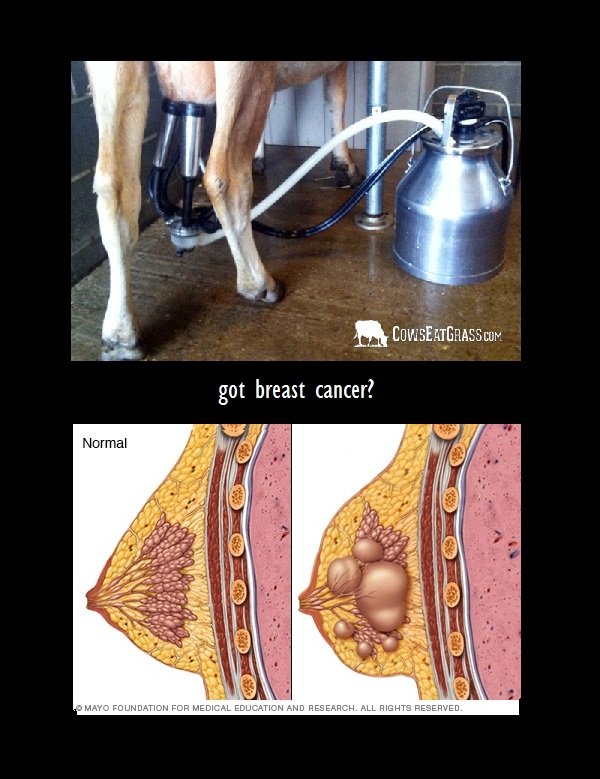
DAIRY IS SCARY!
Wow this post is finally done. It took a lot of research and work. I'm happy to figure out the answers I was looking for and to post my reseach on the blockchain because there's not a lot of good info compiled on the subject. I'm glad I procrastinated a bit because a lot of good studies just came out in 2017/2018.
Downvoting a post can decrease pending rewards and make it less visible. Common reasons:
Submit
Thank you for all the hard work that went into this post!
Downvoting a post can decrease pending rewards and make it less visible. Common reasons:
Submit
A long and interesting read with great links.
Downvoting a post can decrease pending rewards and make it less visible. Common reasons:
Submit
People point the finger at soy for things that aren't even true, but it IS true of dairy, how striking is that?! People don't need as much protein as they think, and getting it from animal sources is all wrong.
Go GREEN for protein. Don't hurt the mama cows and her babies either. You don't need her milk, it will just give you cancer. Soy mylk has enough calcium, protein, calories, and vitamins without bad fat, cholesterol or animal hormones.
Calcium from animal protein gets peed out and not absorbed properly anyway, and that's bad for your kidneys. It doesn't even have all that much calcium anyway, it has to be added in.
Downvoting a post can decrease pending rewards and make it less visible. Common reasons:
Submit
Hi! I am a robot. I just upvoted you! I found similar content that readers might be interested in:
https://lpi.oregonstate.edu/mic/dietary-factors/phytochemicals/soy-isoflavones
Downvoting a post can decrease pending rewards and make it less visible. Common reasons:
Submit
Oh, I missed endometrial cancer, not surprising given the estrogen receptor. I wouldn't be surprised to hear it treats most other types of gynecological cancer too. Thanks
Downvoting a post can decrease pending rewards and make it less visible. Common reasons:
Submit
Congratulations! Your post is selected here https://steemit.com/steemit/@chetanpadliya/my-5-favourite-new-steemit-vegan-posts-of-last-3-days-by-steemians-under-reputation-60-no-13
Downvoting a post can decrease pending rewards and make it less visible. Common reasons:
Submit